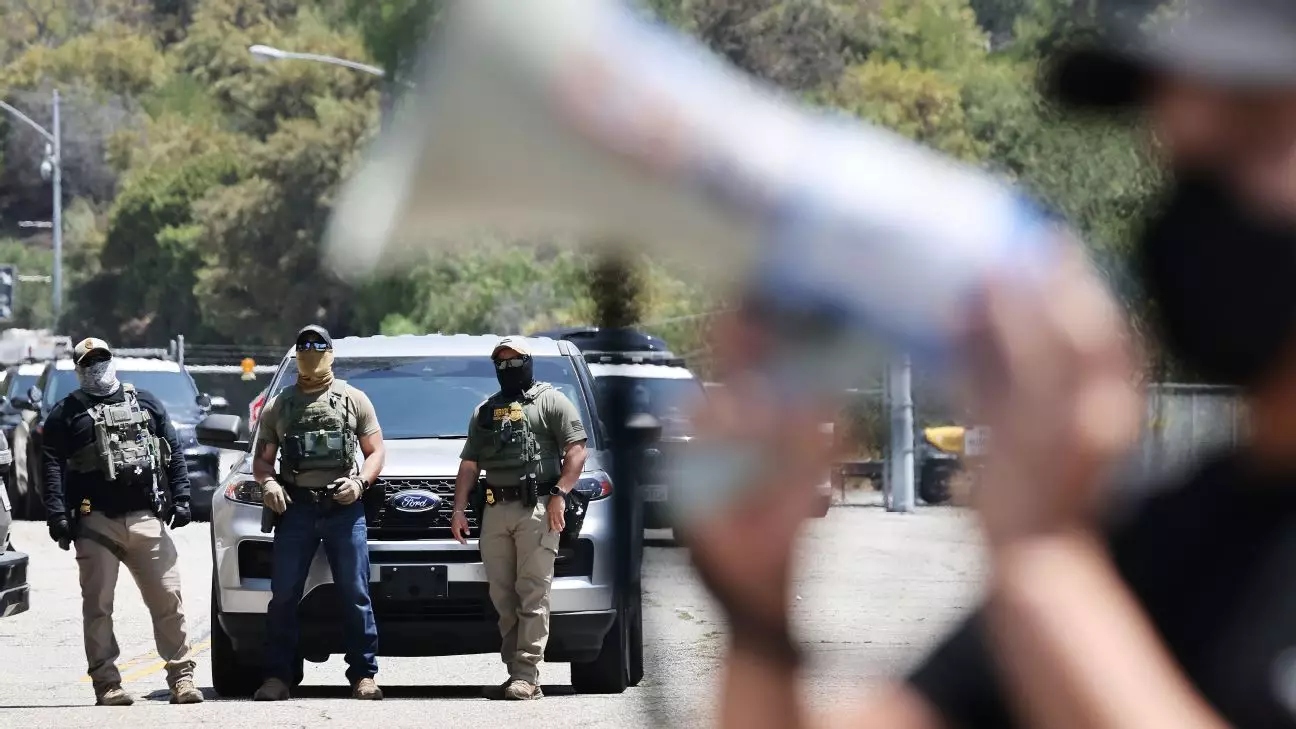In a shocking display of federal authority, agents from the Department of Homeland Security arrived at the iconic Dodger Stadium in Los Angeles early on a Thursday morning, igniting a firestorm of outrage both on social media and in the streets. Their presence was met with immediate pushback from the surrounding community, culminating in protests aimed at opposing immigration enforcement in a city already agitated by past actions from federal agencies. The Los Angeles Dodgers, the cherished baseball team, found themselves at the center of this controversy, which has raised significant questions about the balance between national enforcement policies and the rights of local communities.
Reports indicate that federal agents attempted to gain access to the stadium’s parking lot under the pretense of processing detainees. However, the security personnel tasked with maintaining order drew a defined boundary, refusing the agents entry to private property. It was a symbolic stand by the Dodgers, demonstrating solidarity with the local immigrant population that has increasingly found itself targeted in these raids. The situation escalated quickly, as protesters gathered outside Gate E, demanding accountability and clarity in response to the presence of federal agents.
Protests Erupt: Community Unites Against Immigration Enforcement
As the agents circled the stadium, tensions surged and protests intensified. The Los Angeles police arrived on the scene to disperse the gathering crowd; however, this was not just a localized protest but a microcosm of broader frustration against what many perceive to be aggressive and unwarranted immigration policies enforced by the federal government. Earlier actions by federal agents, including various ICE raids in the city, had already stirred anger and disillusionment among community members, leading to increasingly organized demonstrations.
Citizens took to the streets, blocking major thoroughfares and resulting in confrontations with law enforcement, which included the deployment of tear gas and rubber bullets. These tactics, reminiscent of a militarized response to peaceful assembly, further fueled the outrage. The protests were not solely spontaneous; they represented a concerted effort by immigrant rights groups and community organizations to confront a government seen as overreaching. The risk of significant and potentially violent backlash seems to have escalated as the federal presence threatens the safety and well-being of countless families in Los Angeles.
The Dodgers’ Role and the Impact of Federal Authority
In the midst of this turmoil, the Los Angeles Dodgers had planned to announce partnerships aimed at supporting local immigrant communities, a move that would have demonstrated their commitment to addressing the needs of some of their most dedicated fans. However, the unexpected arrival of federal agents forced them to postpone these plans. Dodgers president Stan Kasten’s reassurances of ongoing support for immigrant initiatives came too late for many, who viewed the team’s initial silence as an abdication of responsibility.
The Dodgers’ predicament reflects a larger struggle that many sports franchises face when entangled in societal issues. Balancing corporate interests with community values is never easy, especially in a politically charged setting. Nevertheless, the overwhelming reaction from fans and community advocates suggests that their involvement, or lack thereof, makes a resounding statement. As public sentiment increasingly aligns against federal approaches to immigration enforcement, organizations are pressured to take a definitive stand.
Conflicting Narratives and the Fight for Justice
The situation was complicated further by conflicting narratives from federal agencies regarding their presence at the stadium. ICE and CBP shifted blame, each agency attempting to disavow excessive involvement in direct activities that have irked communities. Such opacity adds a layer of frustration for individuals on the ground who seek transparency about federal practices that affect their lives. The impact of these actions ripples far beyond the individual cases of detention and deportation; it seeps into the very fabric of community relations and trust.
Public response illustrates a profound disconnect. Many residents of Los Angeles view these federal operations not merely as law enforcement but as an affront to their civil rights and dignity. As the community grapples with the immediate fallout from these raids, the larger question of justice for immigrant populations continues to loom over discussions concerning public safety, community policing, and the values that underpin American society.
The need for a united front against federal overreach has never been more apparent, and the residents of Los Angeles are rallying together firmly with a voice that resonates across the nation, daring to challenge the status quo and advocating for the humanity of all individuals, regardless of their immigration status.

